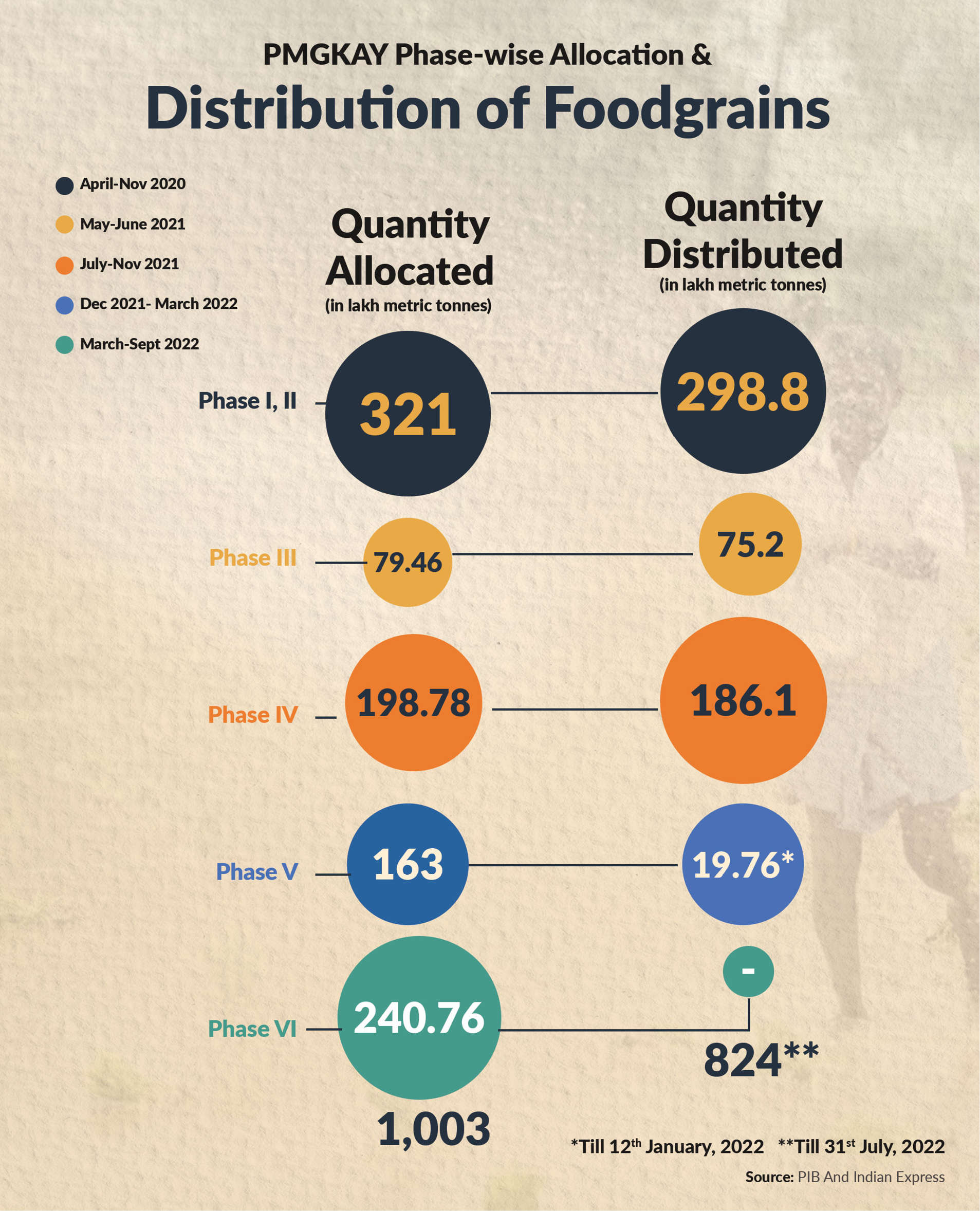
The sixth phase of the Pradhan Mantri Garib Kalyan Anna Yojana is slated to expire on 30th September 2022. Gujarat, with a BJP government, and Rajasthan, with a Congress government, are requesting an extension of the scheme beyond its September 2022 deadline. Gujarat Food & Civil Supply Minister Naresh Patel is likely to request the Central government to extend the scheme till Diwali (October 2022).
Rajasthan’s Minister for Food and Civil Supplies Pratap Singh Khachariyawas clearly demanded the Centre must continue the PMGK Anna Yojana beyond September and also urged the Centre to increase the limit for the number of NFSA beneficiaries for states.
According to Khachariyawas, an upper cap set by the Centre on the number of beneficiaries has severely constrained states’ abilities to help those in need of free grains. This is even as, in cumulative terms, the states have failed to distribute the entirety of the Centre’s allocation of foodgrains.
Uttar Pradesh, with BJP’s Yogi Adiyanath at the helm and Bihar, which recently witnessed a breakup of the ruling National Democratic Alliance (NDA) government, has left it to the Centre to take a final decision on the extension of the Union government scheme.
Punjab and Maharashtra too are willing to follow the Centre’s lead on it. Several other states like Chhattisgarh, Andhra Pradesh, and Telangana are likely to extend the scheme as they already have their own free foodgrains scheme and have claimed they would continue to distribute foodgrains free even if the Centre ends the scheme come September.
Retail inflation in India, measured by the consumer price index (CPI), spiked to 7 per cent in August 2022, up from 6.71 per cent in July even as wholesale inflation in India (measured by the Wholesale Price Index) eased from 13.93 per cent in July 2022 to 12.41 per cent in August.
According to analysts, a rise in the consumer price index, that directly affects the local consumer, would add to the woes of the vulnerable sections. In this scenario, when inflationary pressures are likely to burden household budgets, a scheme such as the Pradhan Mantri Garib Kalyan Anna Yojana may help mitigate the impact of rising prices, especially food bills that take up a large share of the income of households below the poverty line.
However, it is noteworthy that the Centre’s decision to extend the PM-GKAY is not dependent solely on rising prices or the subsidy bill. While deciding on the extension of the scheme, the central government is factoring in the availability of foodgrains stocks in the central pool in light of the weak monsoon and consequent loss of crops.
According to the Ministry of Consumer Affairs, Food and Public Distribution, the scheme was extended to September 2022 and is most likely to go up till March 2023, as demanded by several states, which may have an adverse impact on the rice stock in the central pool.
The burden on the government stocks in the form of increased demand to allocate grains may drop the buffer stock of rice by 22 lakh tonnes thereby costing the exchequer around Rs. 90,000 crore in subsidy.
The scheme has already cost nearly Rs. 2.6 lakh crore since its inception in 2020. Rice stocks of the FCI, in charge of procuring and maintaining foodgrains for the central government, are estimated to be 11.4 million tonnes (mt) in April 2023, against the buffer norm of 13.6 mt, if the free foodgrain scheme is extended. The wheat stock may fall to 9 mt against the buffer of 7.4 mt on 1st April. Recent drought-like conditions in several states due to a poor monsoon have impacted rice production thereby increasing pressure on the country’s wheat stocks.
Indicating the Centre’s unwillingness to extend the scheme, in a statement as early as June 2022, the Expenditure Department of the Union government said, “The free food grain for poor scheme PM-GKAY should not be extended beyond September as it could strain government finances.” Further reinforcing the benefits the scheme has brought, the Department also said the high food security cover has already “created a serious fiscal situation” and is not needed in non-pandemic times.
Source: PIB and Indian Express